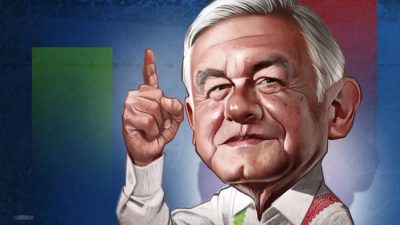
Mexico’s President Elect, Andres Manuel Lopez Obrador, as his best animated self.
After decades of one party rule under the PRI, two standard six year Presidential terms under the PAN and a brisk return to the PRI to remind voters why they ejected them in the first place, Mexicans came out en masse to vote for the ex-mayor of Mexico City, Manuel Lopez Obrador. As the ex-mayor of Mexico City, Mexico’s new President led from the left of the political spectrum as is often the case in many large cities, but won as an independent, apart from Mexico’s main established parties. He challenged the regional and national governments to become a well known quantity running one of the largest cities in the world, and is said to have done a pretty decent job with Mexico City’s transit system during his time as mayor. He is Mexico’s new populist President, and as predicted at the end of populist driven elections, the comparisons to their northern neighbours have begun.
While comparisons to populist leaders lead many to conclude that all populist electoral victories may reflect a US experience, the popularity of Obrador comes with the experience of him as a well-established political voice in Mexican politics. He is well known as a left leaning political voice, but also may likely have to tack back to the centre on several policy files unlike his Canadian counterpart, but remain in the realm of socially oriented policies, unlike his French counterpart. Lopez Obrador’s policies seem to reflect a regional and social division of how they are applied and who they need to serve. He is well aware that raising the cost of business along the border regions and on international firms operating in Mexico will damage their competitiveness as US tax rates have significantly declined. This is not the case in Canada where taxes seem to give birth to more taxes despite the competitive reality of a lower taxes across the border. While this type of policy may seem right of centre, it addresses economic challenges to Mexico is a realistic fashion.
The victory of President elect Andres Manuel Lopez Obrador, often referred to as AMLO, seemed to soak up the political will of those that were tired of years of problems that never seemed to be successfully challenged by established political parties. Like Macron in France, AMLO ran apart from the establishment, also running apart from any record that may be tied to them. Challenging corruption and security issues was paramount, as it always is in Mexico since the PAN turned up the heat on security issues during their time in office and the metaphorical kitchen caught fire, mind you it was a PRI built kitchen. While Macron swiftly moved to the centre in his policy approaches post-election, Lopez Obrador may have to have a creative response to the current NAFTA negotiations if he wishes to maintain his socially oriented policies. Negotiating with an aggressive American side and a Canadian side that are blind to most issues facing Mexico will be a challenge as local politics in the US and Canada are pushing NAFTA and Mexico into dangerous territory. While the North American economy is strong, working out the best deal for Mexico while maintaining a socially balanced agreement that serves the Mexican economy and the unique state of Mexico’s population compared to their NAFTA partners will be an enormous challenge.
Corruption is often why many well established parties lose the electorate, but once elected, the problems that plagued or were even created by the last governments lay on the shoulders of the current government. The characteristic one term, six year Presidential term for Mexican Presidents give a lot of time and opportunity to challenge the status quo, but it is a great challenge that anyone who sees themselves as valuing their country can support if the end of corruption is made into a possibility. The problem with corruption however is that once it is entrenched, it is almost impossible to eliminate. This will be the greatest challenge to AMLO and has been to all government in modern Mexican history.